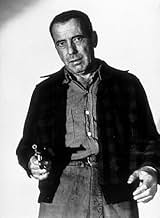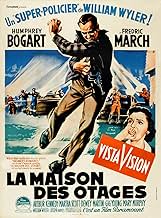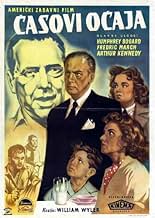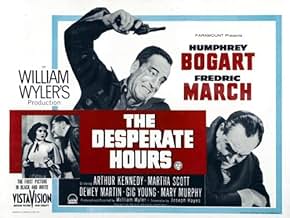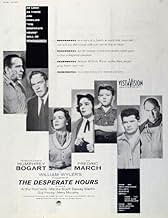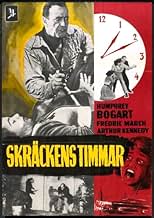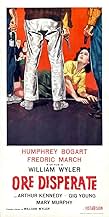VALUTAZIONE IMDb
7,5/10
11.209
LA TUA VALUTAZIONE
Tre condannati evasi terrorizzano una casa suburbana.Tre condannati evasi terrorizzano una casa suburbana.Tre condannati evasi terrorizzano una casa suburbana.
- Premi
- 2 vittorie e 1 candidatura
Walter Baldwin
- George Patterson
- (non citato nei titoli originali)
John Benson
- Bellboy
- (non citato nei titoli originali)
Paul E. Burns
- Chef at Al's Dining Room
- (non citato nei titoli originali)
Edmund Cobb
- Mr. Walling
- (non citato nei titoli originali)
Trama
Lo sapevi?
- QuizThe character of Glenn Griffin was made older so Humphrey Bogart could play the role. The stage version starred Karl Malden and a young Paul Newman in the Bogart role.
- BlooperBefore Glenn asks Eleanor if she could make a phone call without crying, he puts his left hand in his pocket. When she stands up and walks to the phone, he puts the same hand in the pocket again.
- Citazioni
[first lines]
[the morning newspaper hits the front door]
Ellie Hilliard: I'll get it, darling.
Daniel Hilliard: [about the newspaper boy's routine of always hitting the front door with the newspaper] Some morning I'm gonna catch up with that kid.
- ConnessioniFeatured in The Colgate Comedy Hour: Episodio #6.3 (1955)
Recensione in evidenza
Bogie had done films like this one before: The Petrified Forest (1936), High Sierra (1941), Key Largo (1948) and We're No Angels (1955) all with Bogie as a gangster or victim of a gangster, in a desperate setting (although the last one is a comedic spoof). Desperate Hours, however, is different this time out, Bogie (as Glen Griffin) has a whole suburban family as hostage as he tries to complete his run for freedom from the law. Is this the first such home invasion type movie? Perhaps Suddenly (1954)?
The story is simply superb. Every good narrative succeeds because of certain literary aspects: a believable story line, down-to-earth dialog that supports it, a good measure of irony at appropriate turning points, just the right amount of coincidence that can intrude on anybody's daily experience, a dogged police officer who just won't give up in the search for what he believes, and a family an ordinary family that finds within itself the courage, imagination, and strength to persevere in the face of the real threat of death.
I saw this film long ago when just a lad, so I didn't recall much of the story at all. But, being a Bogie fan, I looked forward to seeing it again when I got a hold of a DVD recently. I don't recall what movies were in the running for the Oscars that year, but I think this should have been a contender (apparently, it wasn't).
The cast was well chosen. Bogie, of course, was "made" for this part, having done so many like it in the past and that's not a side-swipe at typecasting; Robert Middleton almost steals the movie with his portrayal of the psychopathic Kobish -- a chilling portrayal; Dewey Martin as Bogie's brother, Hal, provides a sense of decency that the other two lack, the only jarring note for me: why should he? He's on the run, and drops all pretense of humanity when he decides to cut and run by himself. And, we know what happens to anybody who cuts and runs, right? Frederic March as Dan Hilliard ably shows what can happen to your principles and behavior when lives are at stake: most of life's niceties go out the window as he tries to save his family. Understandable, given the desperate situation. Martha Scott as his wife and Mary Murphy as his daughter (Cindy) are suitably frightened most of the time, but they also summon the courage to oppose the bad guys when possible. The guy who isn't used so much is Arthur Kennedy as deputy sheriff Bard, but his role is pivotal in bringing the story to a satisfactory ending. Pity, because Kennedy was as fine an actor as Bogie or March. Gig Young, as Cindy's suitor, rounds out the main cast he playing the puzzled hopeful who just won't go away when Cindy pleads with him to "stay away". It's just as well that he didn't...
The setting in small town America is just right, the picture perfect home of the Hilliards standing for the American dream that is about to threatened and even destroyed. Which gives rise to one of the best lines in cinema history, spoken by March near the end: "Get out get out of my house!" he nearly screams at Bogie, thus cementing forever in film the idea of a man's home as his castle. Bogie visibly wilts before the stern and righteous wrath of March but not only because of that does Bogie give it all up. You'll have to see the film to understand why.
Most of the action is within the confines of the Hilliard house (having been a stage play first, that makes sense) and the cinematography takes full advantage of all those nooks and crannies to enthrall the viewer and keep the suspense running. I liked particularly the reasonably long take of the camera behind the bad guys while they watch the old trash collector do his work and who seems to miss the presence of their stolen car in the garage. It's a priceless piece of work as the escapees faces keep looking at each other and then at the old man and the viewer stays on edge, all the time, wondering: will he react?
The final showdown is simply a tour de force. It's fast and furious, ranging all through the ground floor, up the stairs and into the bedrooms, and then back again, as the protagonists fight it out for supremacy; I was reminded of Dustin Hoffman's running fight with the bad guys in Straw Dogs (1971). In the hands of an inept director, it would have been farcical but Wyler turns on the suspense and the irony as March overcomes his adversary Bogie in one of the coolest ways imaginable. No, I won't tell you, because that would spoil it for you.
As the credits rolled by at the end, my immediate thought was that this type of story is so believable, it could happen to me, or you...
The story is simply superb. Every good narrative succeeds because of certain literary aspects: a believable story line, down-to-earth dialog that supports it, a good measure of irony at appropriate turning points, just the right amount of coincidence that can intrude on anybody's daily experience, a dogged police officer who just won't give up in the search for what he believes, and a family an ordinary family that finds within itself the courage, imagination, and strength to persevere in the face of the real threat of death.
I saw this film long ago when just a lad, so I didn't recall much of the story at all. But, being a Bogie fan, I looked forward to seeing it again when I got a hold of a DVD recently. I don't recall what movies were in the running for the Oscars that year, but I think this should have been a contender (apparently, it wasn't).
The cast was well chosen. Bogie, of course, was "made" for this part, having done so many like it in the past and that's not a side-swipe at typecasting; Robert Middleton almost steals the movie with his portrayal of the psychopathic Kobish -- a chilling portrayal; Dewey Martin as Bogie's brother, Hal, provides a sense of decency that the other two lack, the only jarring note for me: why should he? He's on the run, and drops all pretense of humanity when he decides to cut and run by himself. And, we know what happens to anybody who cuts and runs, right? Frederic March as Dan Hilliard ably shows what can happen to your principles and behavior when lives are at stake: most of life's niceties go out the window as he tries to save his family. Understandable, given the desperate situation. Martha Scott as his wife and Mary Murphy as his daughter (Cindy) are suitably frightened most of the time, but they also summon the courage to oppose the bad guys when possible. The guy who isn't used so much is Arthur Kennedy as deputy sheriff Bard, but his role is pivotal in bringing the story to a satisfactory ending. Pity, because Kennedy was as fine an actor as Bogie or March. Gig Young, as Cindy's suitor, rounds out the main cast he playing the puzzled hopeful who just won't go away when Cindy pleads with him to "stay away". It's just as well that he didn't...
The setting in small town America is just right, the picture perfect home of the Hilliards standing for the American dream that is about to threatened and even destroyed. Which gives rise to one of the best lines in cinema history, spoken by March near the end: "Get out get out of my house!" he nearly screams at Bogie, thus cementing forever in film the idea of a man's home as his castle. Bogie visibly wilts before the stern and righteous wrath of March but not only because of that does Bogie give it all up. You'll have to see the film to understand why.
Most of the action is within the confines of the Hilliard house (having been a stage play first, that makes sense) and the cinematography takes full advantage of all those nooks and crannies to enthrall the viewer and keep the suspense running. I liked particularly the reasonably long take of the camera behind the bad guys while they watch the old trash collector do his work and who seems to miss the presence of their stolen car in the garage. It's a priceless piece of work as the escapees faces keep looking at each other and then at the old man and the viewer stays on edge, all the time, wondering: will he react?
The final showdown is simply a tour de force. It's fast and furious, ranging all through the ground floor, up the stairs and into the bedrooms, and then back again, as the protagonists fight it out for supremacy; I was reminded of Dustin Hoffman's running fight with the bad guys in Straw Dogs (1971). In the hands of an inept director, it would have been farcical but Wyler turns on the suspense and the irony as March overcomes his adversary Bogie in one of the coolest ways imaginable. No, I won't tell you, because that would spoil it for you.
As the credits rolled by at the end, my immediate thought was that this type of story is so believable, it could happen to me, or you...
- RJBurke1942
- 31 dic 2006
- Permalink
I più visti
Accedi per valutare e creare un elenco di titoli salvati per ottenere consigli personalizzati
- How long is The Desperate Hours?Powered by Alexa
Dettagli
- Data di uscita
- Paese di origine
- Lingua
- Celebre anche come
- The Desperate Hours
- Luoghi delle riprese
- Azienda produttrice
- Vedi altri crediti dell’azienda su IMDbPro
Botteghino
- Budget
- 2.388.000 USD (previsto)
- Tempo di esecuzione1 ora 52 minuti
- Colore
- Proporzioni
- 1.37 : 1(original ratio)
Contribuisci a questa pagina
Suggerisci una modifica o aggiungi i contenuti mancanti

Divario superiore
By what name was Ore disperate (1955) officially released in India in English?
Rispondi

